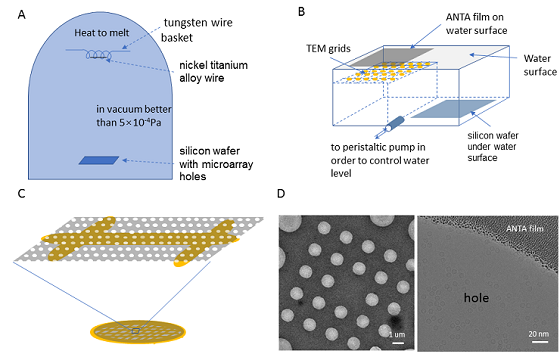
Newsroom
Scientists in China recently developed a new supporting substrate, the amorphous nickel-titanium alloy (ANTA) film, to prepare supporting film covering on TEM grid used for single-particle cryo-electron microscopy.
Single-particle cryo-electron microscopy is one of the important tools for structural biology research. The sample type targeted by this technique is a biomacromolecule solution. Compared with X-ray crystallography, this technique has low requirements on samples and does not require crystallization, but there are still many bottlenecks in sample preparation.
An ideal cryo-electron microscopy sample requires the sample to be uniformly dispersed in a complete form and randomly distributed in the thin ice layer in the grid hole, and the sample to have sufficient conductivity. However, in the real-life conditions, sample particles are mainly distributed on the grid hole instead of in the grid hole, the sample amount distributed in the hole is small, the sample distribution has an orientation advantage, and the sample is denatured under the action of the air-water interface, poor conductivity of the sample leads to serious image drift of cryo-electron microscopy.
Existing solutions for these problems include laying continuous ultra-thin films (carbon film, graphene film, graphene oxide film, protein two-dimensional crystal film, etc.), using affinity membranes to selectively absorb more samples onto the continuous ultra-thin film, and changing the material of the supporting film (such as using pure gold supporting film) and so on. These solutions can improve one or more problems, or make the sample evenly distributed in the grid hole, or keep the sample away from the air-water interface to avoid orientation advantages and sample denaturation, or improve the conductivity of the overall sample by enhancing the conductivity of the supporting film, etc.
SUN Fei's group from the Center of Bio-Imaging of the Institute of Biophysics, and YIN Changcheng's group of Peking University used nickel-titanium alloy to prepare amorphous nickel titanium alloy film (Figure 1).
Unlike the supporting film made of pure gold, this nickel titanium supporting film and the traditional carbon microarray supporting film are both amorphous and have the same the usage method, so it can be directly applied to the cryo-electron microscopy sample preparation and data collection.
Researchers found that compared with the traditional carbon microarray supporting film, the nickel titanium alloy one has better conductivity (4 orders of magnitude higher), which can effectively reduce the sample drift caused by electron beam irradiation. Under the same conditions, a higher resolution cryo-electron microscopy three-dimensional reconstruction result can be obtained.
In addition, the surface properties of the amorphous nickel titanium alloy film are different from that of the traditional carbon film, which means biomolecules have very small non-specific interaction with the amorphous nickel titanium alloy film (one order of magnitude smaller than that with the traditional carbon film). This prevents the biological sample from being deformed and focused due to the non-specific interaction with the supporting film, so the distribution density in the amorphous nickel titanium alloy film hole is higher and the dispersion is better.
Besides, cell culture experiments show that the amorphous nickel titanium alloy film has low biological toxicity and can be used for cell growth and in-situ cryo-electron microscopy studies. These experimental results show that the amorphous nickel titanium alloy film is an excellent grid for single-particle cryo-electron microscopy, providing a new choice for cryo-electron microscopy researchers.
Results of the study were published on Progress in Biophysics and Molecular Biology on August 6, 2020, entitled "Amorphous nickel titanium alloy film: A new choice for cryo electron microscopy sample preparation".

Figure 1. Preparation method and cryo-electron microscope photograph of amorphous nickel titanium alloy film covering on TEM grid (Image by Dr. SUN Fei's group)
